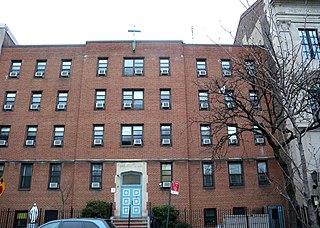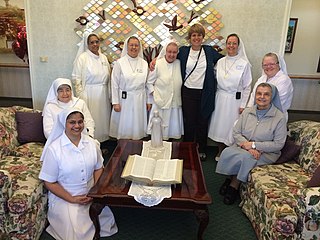Related Research Articles

Herbert Alfred Henry Vaughan, MHM was an English prelate of the Catholic Church. He served as Archbishop of Westminster from 1892 until his death in 1903, and was elevated to the cardinalate in 1893. He was the founder in 1866 of St Joseph's Foreign Missionary Society, known best as the Mill Hill Missionaries. He also founded the Catholic Truth Society and St. Bede's College, Manchester. As Archbishop of Westminster, he led the capital campaign and construction of Westminster Cathedral.
The Franciscan Sisters of Christian Charity are a Congregation of Roman Catholic apostolic religious women. The congregation was founded in 1869 in Manitowoc, Wisconsin in the Roman Catholic Archdiocese of Milwaukee, later part of the Roman Catholic Diocese of Green Bay. The sisters have active apostolates in education, health care, spiritual direction, and other community ministries. As of 2021, there are 188 sisters in the community. The FSCC is a member of the Council of Major Superiors of Women Religious, an organization which represents women religious in the United States.
The Sisters of St. Francis of Perpetual Adoration is a papal congregation of the Roman Catholic Church, founded on July 20, 1863, by Mother Maria Theresia Bonzel in Olpe, Germany. In 1875, they opened St. Elizabeth Hospital in Lafayette, Indiana; now part of the Franciscan Health healthcare system. In 1890 they founded Saint Francis Normal School, a teacher training school; which is now the University of Saint Francis (Indiana).
The Sisters of St. Francis of Assisi is a Catholic religious congregation for women founded in 1849. The motherhouse is in St. Francis, Wisconsin, in the Archdiocese of Milwaukee.

The Franciscan Missionaries of Mary are a Roman Catholic religious institute founded by Mother Mary of the Passion at Ootacamund, then British India, in 1877. The Missionaries form an international religious congregation of women representing 79 nationalities spread over 74 countries on five continents.
The Third Order of Saint Francis is a third order in the Franciscan tradition of Christianity, founded by the medieval Italian Catholic friar Francis of Assisi.

The Franciscan Handmaids of the Most Pure Heart of Mary are a historically Black Catholic congregation of nuns co-founded by Mother Mary Theodore Williams and Fr Ignatius Lissner in 1916. They follow the Rule of the Third Order of St. Francis. Their primary mission has always been education, primarily of children of the African-American community.
The Tertiary Sisters of St. Francis is a congregation of Roman Catholic religious sisters of the Third Order of St. Francis which was founded by Venerable Maria Hueber in 1700 in Brixen, Italy, in the South Tyrol. Their international motherhouse is in Rome.

Franciscan spirituality in Protestantism refers to spirituality in Protestantism inspired by the Catholic friar Saint Francis of Assisi. Emerging since the 19th century, there are several Protestant adherent and groups, sometimes organised as religious orders, which strive to adhere to the teachings and spiritual disciplines of Saint Francis of Assisi.
Alice Ingham was an English Catholic religious sister and missionary. She founded the Franciscan order of Sisters of St. Joseph's Society for Foreign Missions.

The Church of St. Francis of Assisi is a parish church under the authority of the Roman Catholic Archdiocese of New York, and is located at 135–139 West 31st Street, Manhattan, New York City. The parish is staffed by the Order of Friars Minor.
The Little Franciscans of Mary (P.F.M.) is a Catholic congregation of women. Founded in Worcester, Massachusetts, the motherhouse is in Baie St. Paul, Quebec.

Ignatius Francis Lissner, S.M.A. was a French-born Catholic priest who was instrumental in developing the ministry of the Church in the United States to the African-American population.
The congregation of the Franciscan Sisters of Allegany, with its motherhouse at St. Elizabeth's Motherhouse, Allegany, New York, was founded in 1859 by the Very Rev. Father Pamfilo of Magliano, O.F.M.
The Mill Hill Missionaries (MHM), officially known as the Saint Joseph's Missionary Society of Mill Hill, is a Catholic society of apostolic life founded in 1866 by Herbert Alfred Vaughan, MHM.
The Sisters of Mary Reparatrix are a religious institute of women in the Catholic Church which was founded in France in 1857. Their way of life has been to combine adoration of God with the evangelization of society, especially for women.
Mary Ignatius Hayes, O.S.F., also known as Mother Mary Ignatius of Jesus, was an Anglican religious sister who was later received into the Catholic Church and became a Franciscan sister. Her lifetime of religious service, in the course of which she traveled widely, led to the establishment of three separate religious congregations of Franciscan sisters and the establishment of the Poor Clare nuns in the United States.

The Franciscan Hospitaller Sisters of the Immaculate Conception are members of a Roman Catholic religious institute of consecrated women, which was founded in Portugal in 1871. They follow the Rule of the Third Order Regular of St. Francis. and, as the term “hospitaller” indicates, focus their ministries on a spirit of medical care. Their charism emphasizes hospitality and service under the model of the Good Samaritan. In this congregation, the postnominal initials used after each Sister's name is "F.H.I.C."

Teresa Kearney CBE (1875–1957) was a teacher, Franciscan Sister, and missionary, who founded a new Franciscan order. Born in Arklow, Ireland on April 28, 1875, she became a Junior Assistant Mistress at 17 and taught in Essex, England. On December 2, 1902, she left to begin missionary work in Nsambya, Uganda, working as a Franciscan Sister of Saint Mary's Abbey, Mill Hill, London.
References
- ↑ Gillard, John Thomas (1930). The Catholic Church and the American Negro. Baltimore: St. Joseph's Society Press. p. 163.
- ↑ Anderson, Gerald H. (1999). Biographical Dictionary of Christian Missions. Wm. B. Eerdmans Publishing. p. 696. ISBN 978-0-8028-4680-8.
- ↑ "Part 1: Our History". Mill Hill Missionaries.
- ↑ "Franciscan Third Order Regular Sisterhoods: United States: I. Sisterhoods with a Primary Site in the United States". St. Bonaventure University.
- ↑ "Part 2: The Society". Mill Hill Missionaries.
- ↑ "Part 3: Mission in North America". Mill Hill Missionaries.
- 1 2 "About Us: History". St. Elizabeth School. Archived from the original on 2015-09-26. Retrieved 2015-10-10.
- ↑ Kelly, Jacques; Waldron, Thomas W. (March 20, 1993). "Grace and strength marked life of a nun 'who gave her life to helping people'". The Baltimore Sun .
- ↑ Kelly, Jacques (November 12, 2013). "Sister Irene Marshiano, founder of the Franciscan Center, dies at 70". The Baltimore Sun.
- ↑ Siegel, Eric and James, Michael. "Nun slain at her convent warrant issued Police hunt Baltimore man, 34, who is charged in killing", The Baltimore Sun, March 20, 1993
- ↑ "Baltimore Franciscans Merge with Us". Sisters of St. Francis of Assisi. Archived from the original on 2015-12-27. Retrieved 2015-10-10.